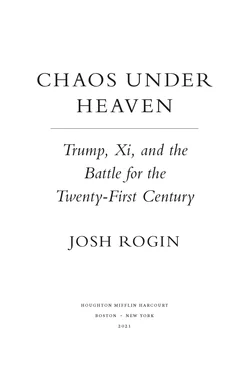The US national security community was now reaching into these other areas of society that had not previously been keen on taking orders from the US government in ways it had never done before, enlisting them in the China competition whether they liked it or not. In China, the government and the schools, tech firms, and investment companies worked in very close tandem—with the party in charge of all of the above. In the United States, the system had never worked that way; US institutions and companies were proud of their independence, and although they were having their own difficulties regarding China, the vast majority would not consider calling for the US government to come in and help them. So unsurprisingly, when the national security community in Washington began forcing these institutions to grapple with confronting China’s malign behavior on US campuses, on the US internet, and in US markets, each of these sectors resisted the call for more coordination with the government on the China challenge.
This intransigence was baked into the distinction between America’s private and public sectors, each of which had its own relationships in China. In this sense, US firms and universities were like autonomous foreign policy actors, each with its own domestic lobbying efforts. Beijing used these relationships to resist the growing calls for scrutiny of the CCP’s activities on American soil. But because these calls were now coming from a widening swath of the federal government, they were becoming harder and harder for private institutions to ignore.
The stakes could not have been higher—because America’s universities, its scientific research community, Silicon Valley, and Wall Street all are crucial to the US response to China’s rise. Universities influence public opinion and knowledge but also spearhead innovation. Silicon Valley is the kitchen for all the technologies of the future. Wall Street holds the world’s greatest source of money by far—and gives access to over one hundred million US investors. Beijing has realized their importance for many years and invested in each of them strategically and heavily. The United States was just beginning to realize the scale and scope of the problem—and the immense challenge that China’s abuse of US institutions poses for Americans’ security, prosperity, freedom, and public health.
“Political Tools”
The CCP views the American values of academic freedom and free expression (and other freedoms) as not only antithetical to its model but also as direct challenges to its governance—a threat, in fact, to what the party defines as China’s existential and ideological struggle with the West. Document 9, the 2013 memo approved by Xi Jinping and later revealed to the world, emphasizes the importance of controlling the public discussion and deems civil society, the free press, and the promotion of individual rights to be “political tools” used by “Western anti-Chinese forces.” As part of the CCP’s effort to “consciously strengthen management of the ideological battlefield,” the party has developed extensive programs to promote its political views in American academic institutions, blunt any criticism of CCP policies on campus, and stifle the free speech of Chinese students studying in the United States.
China has been seeking influence on American campuses for decades, in a variety of ways. The most controversial ones are through Confucius Institutes, Chinese student organizations, and direct funding and donations. Each of these avenues of influence provides the CCP with relationships on campuses that have both positive and negative implications.
The Chinese government sponsors language programs, education exchanges, and research, much of which is constructive or benign. Independently or through these programs, hundreds of thousands of Chinese students study at American universities, bringing value to these schools and taking a better understanding of the United States back to China. The vast majority of these students have no connection to the Chinese state and are simply trying to get an education and better their lives. They are the victims both of their own government’s abuses and of Americans’ discrimination and racism, which are exacerbated by some of Trump’s statements and policies.
At the same time, grave concerns about China’s influence on US campuses are warranted. This poses a tragic dilemma—albeit one whose urgency isn’t diminished by its intractability.
Over the course of 2018 and 2019, parts of the national security community, law enforcement agencies, the intelligence community, and Congress began forcing a difficult conversation in academia about how to manage increasingly malign Chinese interference on US campuses. This caused a clash with the universities and others who were invested in their projects with the Chinese government. The first major battle was over Chinese government-sponsored language schools embedded in US colleges, called Confucius Institutes.
Confucius on Campus
The most visible signs of China’s influence operations on American campuses are Confucius Institutes, Chinese government-sponsored and government-run language and cultural teaching outposts that are embedded inside foreign universities. The CCP has built over five hundred Confucius Institutes and over two thousand Confucius Classrooms in over 154 countries since the program was established in 2004. The Confucius Institute system reports to a part of the CCP’s educational ministry, called the Hanban, which in 2020 was renamed the Ministry of Education’s Centre for Language Education and Cooperation. Universities typically sign contracts that—in exchange for funding—allow the Chinese government to choose the instructors and the curriculum. The program was founded by a former head of the United Front Work Department.
FBI director Christopher Wray launched the opening salvo against Confucius Institutes when he testified in February 2018 that they are among the entities used by the Chinese government as “nontraditional collectors [of intelligence], especially in the academic setting,” in large and small cities all across the United States. He said the FBI was “watching warily” and investigating in “certain instances.” Wray accused the US academic sector of naïveté for hosting these CCP outposts—and accused the CCP of “exploiting the very open research and development environment that we have, which we all revere.”
At their peak, Confucius Institutes existed on more than one hundred North American college campuses. Around sixty still exist at the time of this writing. Not all Confucius Institutes are the same. After Wray made his comments, I signed up to join the Confucius Institute at the George Washington University, my alma mater. I registered for Chinese Language 101. There was nothing nefarious going on in that classroom, just some college students learning Chinese.
But at some other schools, there were real concerns. FBI agents had alerted the University of West Florida that they suspected its Confucius Institute staff were conducting espionage and they had opened an investigation. The university closed the institute, quietly. When I called the president of the university, she told me it was closed due to a lack of interest and denied the FBI had spoken to her. She had other interests to protect. The university has been collaborating with China to bring students and teachers back and forth since 1987.
One of the first clashes between the national security community and academia regarding Confucius Institutes occurred quite by accident, but it had a cascading effect around the country. In an April 2018 panel at the National Press Club, former Arizona congressman Matt Salmon, now Arizona State University’s vice president for government affairs, bragged (incorrectly) that the Pentagon was funding ASU’s Confucius Institute. He claimed that the Pentagon did not see the institute as a national security concern, and in fact used the Confucius Institutes to recruit Chinese speakers into the US government. Salmon also said those who are concerned about the institutes were engaged in “McCarthyism,” adding that “if it does pose a security threat, then the Department of Defense has made a big mistake by funding our program.”
Читать дальше











